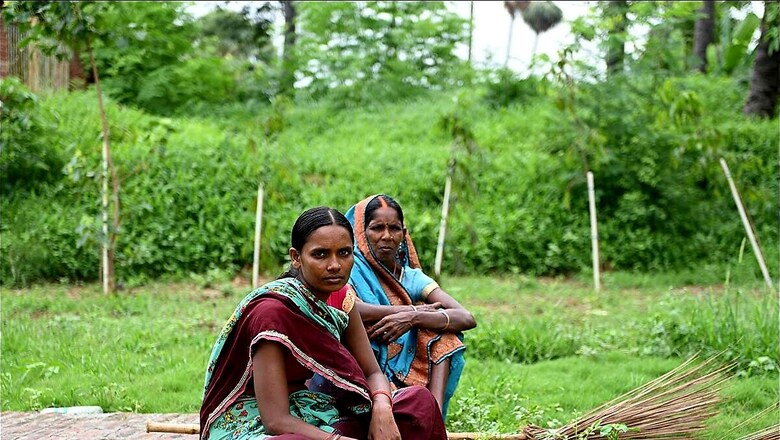
views
In India, where we still suffer the holdover from the caste system, certain professions enjoy massive privileges – doctors, for instance. That is a great thing, if only it didn’t also work to denigrate certain other professions, like sanitation work. The caste system codified work into certain communities in such a way that, over time, it became the only work that these communities were ‘allowed’ to do.
Of course, these are jobs that are poorly paid. So, over generations, these communities got poorer and poorer, lacked educational opportunities and access, and the only ‘logical’ jobs for them, became the ones that society sanctioned: that is, to clean our toilets.
However, it is important to note that our modern societies can’t function without sanitation workers. Can you even imagine the mountains of waste that would accumulate without these essential workers? Or the state of our toilets? Or the state of our health in these hellish conditions?
That’s why women sanitation workers play a vital role in improving the lives of their communities. They are the ones who build, clean, and maintain toilets, educate people about hygiene practices, and advocate for better policies and resources. They are also the ones who face the stigma, discrimination, and risks associated with their work.
Challenges women sanitation workers face in rural areas
Women sanitation workers, particularly in rural areas, face multiple barriers that hinder their work and well-being.
Lack of awareness and appreciation: Many people in rural areas don’t understand the importance of sanitation and hygiene, and don’t value the work of women sanitation workers. They may be uncooperative, or even actively oppose the work. For example, some people may resist using toilets, or throw garbage or menstrual waste into them. Some may also harass or abuse women sanitation workers verbally or physically.
Lack of safety and security: Women sanitation workers often work in unsafe and unsanitary conditions, exposing them to health hazards and injuries. They often work without protective equipment, tools, or facilities. They may also face threats from animals, insects, or criminals while working in isolated or remote areas; and face additional risks of accidents and violence while travelling long distances at odd hours, to get to their place of work.
Lack of recognition and rights: Women sanitation workers are often poorly paid. They usually don’t have formal contracts, job security, or social benefits. Moreover, they face discrimination and exclusion from decision-making, and leadership positions aren’t open to them. In the unorganised sector, they have no access to grievance mechanisms or legal aid to address their issues or complaints.
Lack of support and empowerment: Women sanitation workers are often uneducated, and lack training to perform their work effectively or advance their careers. Coming from the backgrounds they do, they often have low confidence and minimal agency to assert their rights or voice their opinions. Additionally, in India, social or cultural norms restrict their mobility, choices, or opportunities.
The Role of Institutions
Harpic, as India’s leading brand in the lavatory care segment, has a deep and nuanced understanding of the specific challenges that these women sanitation workers face, and this is what led to the establishment of the Harpic World Toilet College (HWTC) in 2016.
HWTC was established with the stated objective of improving the quality of life of sanitation workers through their rehabilitation by linking them with dignified livelihood options. Workers trained by the college are provided placement with various organisations. Following the successful proof of concept in Rishikesh, HWTCs have opened in Maharashtra, Aurangabad, in partnership with Harpic, Jagran Pehel and Maharashtra Government.
Institutions like HWTC play a pivotal role in supporting rural women sanitation workers.
Specialised Training
This specialised training equips rural women sanitation workers with essential skills and knowledge. It goes beyond the technical aspects of their work, encompassing health and safety practices, environmental awareness, and personal development.
Empowerment
In HWTC’s experience, empowerment for these women comes from having a sense of pride in their work. Through motivational sessions and confidence-building exercises, women sanitation workers gain the strength to overcome societal stigmas and assert their rights to dignity and respect.
Career Advancement
Once trained at HWTC, numerous doors open to career advancement. Sanitation workers often have no exposure to the variety of jobs that are open to them, in the organised sector. Once in these jobs, these women can aspire to (and achieve!) supervisory roles, and even better pay.
Community Impact
As trained and empowered women sanitation workers advocate for proper sanitation practices, they bring about positive changes in their communities. This ripple effect helps everyone – trained and untrained, and contributes to overall hygiene and cleanliness for the community.
Stories of Triumph
HWTC and other institutes and NGOs in this space are full of inspiring stories of change.
When Rani Devi’s husband left, she became the family’s sole breadwinner. Unqualified for anything else, she took up sanitation work. Once she received training from HWTC, Rani Devi felt empowered to form a women’s sanitation worker group and initiated mechanised cleaning cooperatives. Her leadership and determination have transformed her community’s sanitation practices.
Another truly inspiring story is that of Usha Chaumar, a former sanitation worker who received the Padma Shri award for her work in uplifting women in sanitation. Today, she is the President of Sulabh International Social Service Organisation, but that wasn’t always the case. She began cleaning toilets at the tender age of 7, earning ₹10 per month from each household.
Today her work inspires and enables thousands of other sanitation workers like herself, and she has also been able to create a much better life for her own family – her oldest son is pursuing a postgraduate degree, something she knows he wouldn’t have had access to, without the choices she was able to make.
Proliferating Change
Change usually starts in little pockets, and then spreads like a wildfire. Fanning the flames of that wildfire involves the momentum that large awareness campaigns bring.
Harpic understands the power of public opinion, having seen the changes in sanitation in India over the years. In order to amplify the voices that matter, Harpic joined hands with News18 to create Mission Swachhta aur Paani, a movement that champions the cause of inclusive sanitation, equality for all genders, abilities, castes and classes and the strong belief that clean toilets are a shared responsibility.
Mission Swachhta aur Paani has, for 3 years now, brought to light the many problems facing our sanitation workers. It also celebrates stories like the ones you’ve just read.
Lend your voice to this clarion call, by joining us here.




















Comments
0 comment